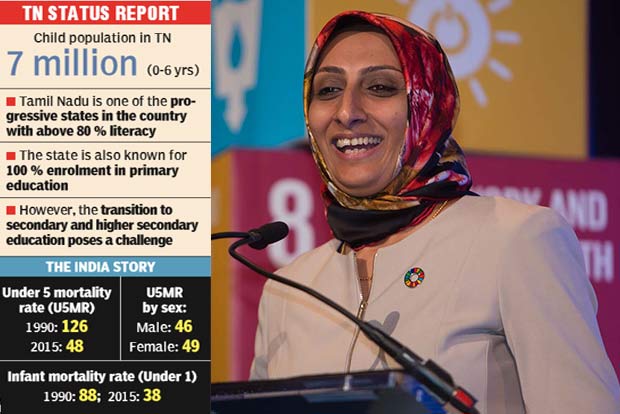Begin typing your search...
UN honour for social entrepreneur from Chennai
Meet Zubaida Bai, a social entrepreneur hailing from Chennai, who was announced as one of the ten Local Sustainable Development Goals (SDG) Pioneers at the UN Global Compact Leaders’ Summit 2016 in New York recently.

Chennai
She was honoured as a Pioneer for Safe and Healthy Birth, for her efforts that align with the third Sustainable Development Goal of health and well-being. The UN Global Compact’s Local SDG Pioneers programme recognises individuals, who are demonstrating how the Sustainable Development Goals (SDGs) can enable businesses to unlock economic, social, and environmental gains for the world.
Zubaida, who attended the CSI Bain School in Kilpauk, founded ayzh (pronounced as ‘eyes’), based on the belief that every woman has the right to a safe birth and affordable healthcare.
“Imagine giving birth without the help of sterile tools, a doctor, nurse or midwife. This is the experience of nearly half of women giving birth in low-income countries — and many are at high risk of infection. These infections often prove fatal. I wanted to change that,” said this mechanical engineer turned social entrepreneur. After earning an engineering degree from Dalarna University in Sweden, Zubaida returned to India to serve women.
“I worked in India for four years developing technology for low-resource settings. Both my husband and I were passionate about helping women, so we started looking for opportunities to design for this under-served population. On a field visit to a rural village, I discovered that some midwives used a sickle — normally used for cutting grass — to cut the umbilical cord. This was an “aha” moment for me,” she reminisced.
Zubaida, a mother of three, contracted an infection while giving birth to her first child in one of the best facilities in India. The subsequent reflection led to the inception of ayzh. “I thought, ‘If I had everything and suffered an infection, what would women in these villages be facing?’ This is the moment that made me enter into the world of maternal health. It made me very determined to improve the lives of women. As an engineer and designer of technology, I saw innovative technology being developed that never actually got into the hands of those who needed it most. After earning my MBA in Global Social and Sustainable Enterprise, I founded ayzh in 2009 and a year later, launched the Clean Birth Kit,” related this doting mother.
Her social enterprise, ayzh develops and distributes low-cost health products designed to meet the needs of women in low-resource settings. “Our first product is a Clean Birth Kit designed to provide the “six cleans” of childbirth recommended by WHO. We have sold 250,000 kits, impacting 500,000 women and new-borns. We also have new products in the pipeline including Essential Newborn Care Kits, and menstrual and postpartum hygiene kits. Our model also provides empowerment to local Indian women, who are hired to package and assemble our kits,” explained Zubaida.
The UN honour, pointed out this entrepreneur, was for the entire team at ayzh who strive every day to provide simplicity and dignity to women’s health. “We are in a ‘transition to scale’ phase now. Over the next year, we aim to raise our next round of investment; pilot our expansion model (creating production and distribution hubs across India); launch new products; and begin exploring a formal presence in new global markets, namely East Africa,” she concluded.
TN Governor launches UNICEF Children Report

Dr. K. Rosaiah, Governor of Tamil Nadu, launched The State of World’s Children 2016 - ‘A Fair Chance for Every Child’ — UNICEF’s annual flagship report at Raj Bhavan on June 30. The Governor said, “Today, it is a matter of pride that Tamil Nadu has reached an exemplary position in achieving 100 % enrolment at the primary school. We need to strive harder to attain and sustain higher level of quality in primary schools.” Job Zachariah, Chief, UNICEF office for Tamil Nadu and Kerala, said the state fared better, as compared to the rest of the country. “But this doesn’t mean we can be complacent. We need to do more to bridge the gap,” he said.
Visit news.dtnext.in to explore our interactive epaper!
Download the DT Next app for more exciting features!
Click here for iOS
Click here for Android
Next Story



